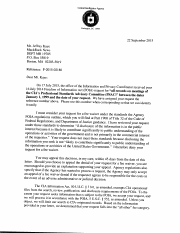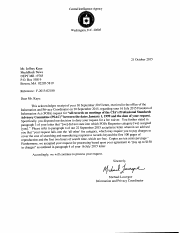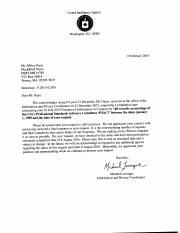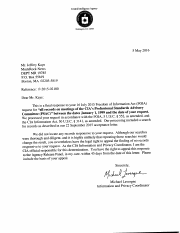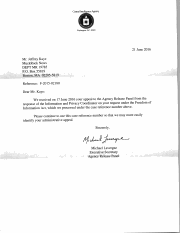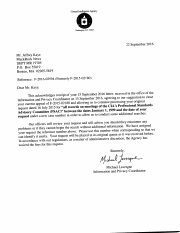Request for records on CIA's Professional Standards Advisory Committee
| Tracking # |
F-2016-02594 |
| Submitted | July 16, 2015 |
| Est. Completion | None |
MuckRock users can file, duplicate, track, and share public records requests like this one. Learn more.
Communications
From: Jeffrey Kaye
To Whom It May Concern:
This is a request under the Freedom of Information Act. I hereby request the following records:
All records on meetings of the CIA's Professional Standards Advisory Committee (PSAC) between the dates January 1, 1999 and the date of this FOIA request. By "records," I include all written agendas, correspondence regarding its work or meetings, emails regarding its work of meetings, memoranda, meeting minutes, membership lists, dates of meetings, written reports that reference its work or are the product of its work, and presentation materials. I note that the PSAC was referenced in a report by Mr. David H. Hoffman of Sidley Austin LLC. The report, dated July 2, 2015, was posted online by the American Psychological Association, which had tasked the report by Mr. Hoffman as an "independent review" of its activities regarding national security interrogations. The URL for the full report is http://www.apa.org/independent-review/APA-FINAL-Report-7.2.15.pdf. The full title of the report is "Report to the Special Committee of the Board of Directors of the American Psychological Association - Independent Review relating to APA Ethics Guidelines, National Security Interrogations, and Torture. The PSAC is the subject of a subsection of this report, which can be found on pages 156-157 of the report.
The requested documents will be made available to the general public, and this request is not being made for commercial purposes.
In the event that fees cannot be waived, I do state here that I will pay up to $150 in charges that exceed what is provided free, but I would be grateful if you would inform me of in advance of producing records of any charges that exceed this amount. I would prefer the request filled electronically, by e-mail attachment if available or CD-ROM if not.
Thank you in advance for your anticipated cooperation in this matter. I look forward to receiving your response to this request within 20 business days, as the statute requires.
Sincerely,
Jeffrey Kaye
From: MuckRock.com
To Whom It May Concern:
I wanted to follow up on the following Freedom of Information request, copied below, and originally submitted on July 16, 2015. Please let me know when I can expect to receive a response, or if further clarification is needed.
Thank you for your help.
From: MuckRock.com
To Whom It May Concern:
I wanted to follow up on the following Freedom of Information request, copied below, and originally submitted on July 16, 2015. Please let me know when I can expect to receive a response, or if further clarification is needed.
Thanks for your help, and let me know if further clarification is needed.
From: Central Intelligence Agency
An acknowledgement letter, stating the request is being processed.
From: Jeffrey Kaye
To: Michael Lavergne, Information and Privacy Coordinator
Re FOIA Reference: F-2015-02180
Dear Mr. Lavergne,
This purpose of this letter is to dispute your decision to allow a fee waiver on my request.
You cite your Agency FOIA regulations outline, which reference Part 1900 of Title 32 of the Code of Federal Regulations, and Department of Justice guidance. You wrote in your September 22, 2015 letter regarding receipt of my July 17, 2015 FOIA request, “I have reviewed your request under those standards to determine “if disclosure of the information is in the public interest because it is likely to contribute significantly to public understanding of the Operations or activities of the government and is not primarily in the commercial interest of the requester.”
You did not state into which FOIA Requester category you assigned me. As a FOIA request made through MuckRock News, a news gathering agency that relies on FOIA as a tool of reportage. I have published there in the past and posted the relevant CIA FOIA document for public consumption. (See https://www.muckrock.com/news/archives/2014/apr/08/cia-declassifies-additional-portions-kubark-interr/ for reference.) Furthermore, the article and the posting of documents was without payment and therefore not of primary commercial interest.
Should CIA determine, as I have been told, it does not consider MuckRock News to be a news agency, according to the category of same in the Code of Federal Regulations or other official guidance, it certainly falls into the category of a “public interest watchdog,” i.e., an organization concerned with “publicizing governmental choices and highlighting possible abuses that otherwise might go undisputed and thus unchallenged.” FOIA’s waiver position is "an attempt to prevent government agencies from using high fees to discourage certain types of requesters and requests," and specifically references journalists, scholars, and nonprofit public interest groups, under which MuckRock News certainly falls. See Better Gov't Ass'n v. Department of State, 780 F.2d 86, 88-89 (D.C. Cir. 1986).
As a further point regarding public dissemination of the requested material, in my initial FOIA request, which was for “[a]ll records on meetings of the CIA's Professional Standards Advisory Committee (PSAC) between the dates January 1, 1999 and the date of this FOIA request [7/16/2015],” I stated generally that “[t]he requested documents will be made available to the general public, and this request is not being made for commercial purposes.” Besides publication through MuckRock News, I intend to also make this material available to the general public via my blog, Invictus (http://valtinsblog.blogspot.com), and other news sites. To make certain the public has free access, the material will also be disseminated through the services of documentcloud.org. In the past I have published at Truthout, The Guardian, AlterNet, and Al Jazeera America, and these could be considered examples of where I also will intend to make the material from this FOIA request available to the public, both in its raw documentary form, and as the subject of analysis for the reader and general public.
The other significant issue regarding a fee waiver concerns the apparent assertion of your office that disclosure of the requested information would not be in the public interest as it was not “likely to contribute significantly to public understanding of the Operations or activities of the government.” I respectfully disagree for the following reasons.
As I stated in my initial request, PSAC was discussed in an investigatory report by Mr. David H. Hoffman of Sidley Austin LLC. Mr. Hoffman is a former U.S. attorney. The report his office produced, dated July 2, 2015, was posted online by the American Psychological Association (APA), which had tasked the report by Mr. Hoffman as an "independent review" of its activities regarding national security interrogations. The URL for the full report is http://www.apa.org/independent-review/APA-FINAL-Report-7.2.15.pdf. The full title of the report is "Report to the Special Committee of the Board of Directors of the American Psychological Association - Independent Review relating to APA Ethics Guidelines, National Security Interrogations, and Torture.”
In my initial request I noted, “The PSAC is the subject of a subsection of this report, which can be found on pages 156-157 of the report.” I wish to add that the minutes of one PSAC meeting, and the substance of that meeting, was also the subject of a section of that report, “Meeting of the CIA Advisory Committee” (see pages 165-166 of report). The meeting took place on January 25, 2002, and the minutes were published as part of a general distribution of documentary materials by APA, and can be found at page 353 of a PDF downloadable at APA’s website. The specific URL for that collection of material, known as “Binder 3”, which holds the PSAC minutes, is http://www.apa.org/independent-review/binder-3.pdf. In other words, APA, the world’s largest association of psychologists, found that distribution of material such as I request to be of significant interest.
I note for the record that the copy of the PSAC minutes posted there has no classification marks, and my assumption is that the PSAC minutes themselves are not considered as “operational” or even classified.
The public interest in the Hoffman report in general was substantial, with articles written at The New York Times (http://www.nytimes.com/2015/07/11/us/psychologists-shielded-us-torture-program-report-finds.html?_r=0), The Washington Post (https://www.washingtonpost.com/world/national-security/report-american-psychological-association-colluded-with-us-interrogation-programs/2015/07/10/42b0cbec-2741-11e5-b72c-2b7d516e1e0e_story.html), NPR (http://www.npr.org/2015/07/11/422008505/leading-u-s-psychologists-secretly-aided-cia-torture), and many other news outlets.
The existence and actions of the PSAC were the matter of at least one news story by The Oregonian on July 11, 2015 (see http://www.oregonlive.com/pacific-northwest-news/index.ssf/2015/07/report_retired_ohsu_psychologi.html).
In a large sense, the operations of the CIA’s Rendition, Interrogation and Detention program has been largely construed of high public interest, and has been an ongoing matter of public reporting for some years now. According to the Hoffman Report (p. 166), which revealed the existence of the PSAC, the “collection of incidents [regarding PSAC] together strongly suggest that, though the Professional Standards Advisory Committee itself might not have consulted on interrogation issues, at least two of the three highly placed members of the Advisory Committee were doing work on the ethics of interrogations.”
In other words, the Hoffman investigation could not rule out the possibility that the PSAC consulted on CIA interrogation issues, and felt certain it could document the work of its members of CIA interrogation issues relating to interrogations. Given that the interrogations in issue have been of high public interest, it stands to reason that a further exploration and documentation of PSAC’s functions would “contribute significantly to public understanding of the Operations or activities of the government” and therefore be in the public’s interest.
Thank your for considering my appeal on the fee waiver issue. Nothing in this appeal affects my earlier to pay up to $150.00 in search or copying costs should this appeal or any further appeal be denied.
Sincerely,
Jeffrey Kaye
From: Central Intelligence Agency
An interim response, stating the request is being processed.
From: MuckRock.com
To Whom It May Concern:
I wanted to follow up on the following Freedom of Information request, copied below, and originally submitted on July 16, 2015. Please let me know when I can expect to receive a response, or if further clarification is needed. You had assigned it reference number #F-2015-02180.
Thanks for your help, and let me know if further clarification is needed.
From: MuckRock.com
To Whom It May Concern:
I wanted to follow up on the following Freedom of Information request, copied below, and originally submitted on July 16, 2015. Please let me know when I can expect to receive a response, or if further clarification is needed. You had assigned it reference number #F-2015-02180.
Thanks for your help, and let me know if further clarification is needed.
From: MuckRock.com
To Whom It May Concern:
I wanted to follow up on the following Freedom of Information request, copied below, and originally submitted on July 16, 2015. Please let me know when I can expect to receive a response, or if further clarification is needed. You had assigned it reference number #F-2015-02180.
Thanks for your help, and let me know if further clarification is needed.
From: Central Intelligence Agency
An interim response, stating the request is being processed.
From: MuckRock.com
To Whom It May Concern:
I wanted to follow up on the following Freedom of Information request, copied below, and originally submitted on July 16, 2015. Please let me know when I can expect to receive a response, or if further clarification is needed. You had assigned it reference number #F-2015-02180.
Thanks for your help, and let me know if further clarification is needed.
From: Central Intelligence Agency
A no responsive documents response.
From: Jeffrey Kaye
June 7, 2016
Agency Release Panel, CIA
c/o Michael Lavergne
Information and Privacy Coordinator
Dear Sir or Madam,
This letter constitutes an administrative appeal under the Freedom of Information Act, 5. U.S.C. Sec.
552(a)(6).
I am writing to appeal the determination by the CIA with regard to my FOIA request filed on
July 16, 2015, #F-2015-02180, for records concerning meetings of the CIA's Professional Standards Advisory
Committee, hereafter "PSAC." By letter of May 5, 2016, I was informed that the CIA FOIA department "did not locate any records responsive to [my] request."
The lack of any responsive records seems untenable, as at least one copy of the minutes of a meeting of the Professionals Standards Advisory Committee is in the public domain, having been released as documentary material by the American Psychological Association (APA) as part of the release of a report by Mr. David H. Hoffman of Sidley Austin LLC (hereafter, "Hoffman Report").
The Hoffman Report, dated July 2, 2015, was posted online by the American Psychological Association, which had tasked the report from Mr. Hoffman as an "independent review" of APA's activities regarding national security interrogations. The URL for the full report is http://www.apa.org/independent-review/APA-FINAL-Report-7.2.15.pdf. The full title of the report is "Report to the Special Committee of the Board of Directors of the American Psychological Association - Independent Review relating to APA Ethics Guidelines, National Security Interrogations, and Torture." The PSAC is the subject of a subsection of this report, which can be found on pages 156-157 of the report.
The minutes of the one PSAC meeting noted above are dated January 25, 2002. They were published as part of a general distribution of documentary materials related to the Hoffman Report by APA, and can be found at page 353 of a PDF downloadable at APA’s website. The specific URL for that collection of material, known as “Binder 3”, which holds the PSAC minutes, is http://www.apa.org/independent-review/binder-3.pdf. The document can be found on page 353 of that PDF.
I would like to add, in order to assist any further search, that in the same PDF file, "Binder 3," on page 349, is a letter dated January 15, 2003, signed by Susan Brandon and Geoff Mumford, both then from APA (although Ms. Brandon also worked for the government), referenced the PSAC. They wrote that the unit had been created by Mr. Kirk Hubbard, then Chief of the Research & Analysis Branch in the CIA's Operational Assessment Division. They wrote: "They currently retain a 3-member paid advisory group consisting of 3 APA members: Joe Matarazzo, Ron Fox, and Mel Gravitz meeting on average once a month, now in their second year of service."
In the Hoffman Report (p. 185), it states, "Sidley spoke with several members of the Advisory Committee, including Kirk Hubbard, Joseph Matarazzo, Ronald Fox, and James Mitchell, and more than one member of the Committee explained that its purpose was to advise the CIA on the methodology for conducting operational assessments of
personnel." Hubbard and Mitchell both worked in the early 2000s for the CIA. None of these individuals stated there was no PSAC. Hence, I add this information to show that it is not tenable that no responsive documents exist for this entity.
I suggest that another search be done, including a search of CIA databases ARCINS and/or AIRRS, or whatever record system is used to reference activities of the CIA's " Operational Assessment Division."
To make matters simpler, in my original request I asked for all PSAC records "between the dates January 1, 1999 and the date of this FOIA request [7/16/2015]." I would like to reduce that time frame to all PSAC records between September 11, 2001 and December 31, 2005. At the same time, I reiterate from my original request that by "records" I am referring to "all written agendas, correspondence regarding its work or meetings, emails regarding its work of meetings, memoranda, meeting minutes, membership lists, dates of meetings, written reports that reference its work or are the product of its work, and presentation materials."
Thank you very much for your consideration of this appeal.
Sincerely,
Jeffrey Kaye
From: Central Intelligence Agency
A letter stating that the request appeal has been received and is being processed.
From: Central Intelligence Agency
An interim response, stating the request is being processed.
From: Jeffrey Kaye
Dear Mr. Lavergne,
Per your letter regarding my appeal of Case F-2015-02180, concerning my FOIA for "all records on meetings
of the Professional Standards Advisory Committee (PSAC) between the dates January 1, 1999 and the date [of my original] request [7/16/15]," I am in accordance with your suggestion. Hence, I approve closing my appeal and processing my original request under a new case number in order to allow your agency to conduct "some additional searches."
I would add that since my original appeal letter, yet another public instance of the existence of the PSAC surfaced in a release of documents surrounding the CIA contracts with James Mitchell and Bruce Jessen, as reported in the Washington Post on July 13, 2016 by Greg Miller. The article was titled, "How a modest contract for ‘applied research’ morphed into the CIA’s brutal interrogation program," and the URL for that article is https://www.washingtonpost.com/news/checkpoint/wp/2016/07/13/how-a-modest-contract-for-applied-research-morphed-into-the-cias-brutal-interrogation-program/.
The documents related to that article, which mention PSCA can be accessed at URL: https://www.documentcloud.org/documents/2992829-Read-the-contracts-for-James-Mitchell.html. On page 18 of that PDF, a purported contract for James Mitchell to work with the CIA states that one of the Project Objectives for which he was hired was to "Provide consultation to the Professional Standards Advisory Committee (PSAC) regarding applied research in high-risk operational settings." Hence, the idea there were no responsive documents to my request seems a conclusion lacking merit.
Thanks, and sincerely,
Jeffrey Kaye
From: Central Intelligence Agency
An acknowledgement letter, stating the request is being processed.
From: MuckRock.com
To Whom It May Concern:
I wanted to follow up on the following Freedom of Information request, copied below, and originally submitted on July 16, 2015. Please let me know when I can expect to receive a response, or if further clarification is needed. You had assigned it reference number #F2016-02594.
Thanks for your help, and let me know if further clarification is needed.
From: Central Intelligence Agency
An interim response, stating the request is being processed.
From: MuckRock.com
To Whom It May Concern:
I wanted to follow up on the following Freedom of Information request, copied below, and originally submitted on July 16, 2015. Please let me know when I can expect to receive a response, or if further clarification is needed. You had assigned it reference number #F-2015-02180.
Thanks for your help, and let me know if further clarification is needed.
From: Central Intelligence Agency
A no responsive documents response.
From: MuckRock.com
To Whom It May Concern:
I wanted to follow up on the following Freedom of Information request, copied below, and originally submitted on July 16, 2015. Please let me know when I can expect to receive a response, or if further clarification is needed. You had assigned it reference number #F-2015-02180.
Thanks for your help, and let me know if further clarification is needed.
